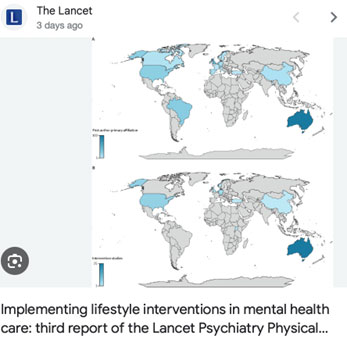
(Lancet Psychiatry, published September 2025)
People with mental illnesses have a 13–15-year reduction in life expectancy, compared with those without mental illness. Lifestyle risk factors, such as high smoking rates, low physical activity, high levels of sedentary behaviour, low cardiorespiratory fitness, lower diet quality, detrimental eating behaviour, and poor sleep hygiene, drive these. Lifestyle interventions are of benefit in mental health settings, but the report highlights the need to shift the focus from efficacy towards implementation research and address how best to implement and deliver lifestyle interventions as core clinical practice.
For full access (after registration), please click here: https://www.thelancet.com/journals/lanpsy/article/PIIS2215-0366(25)00170-1/abstract